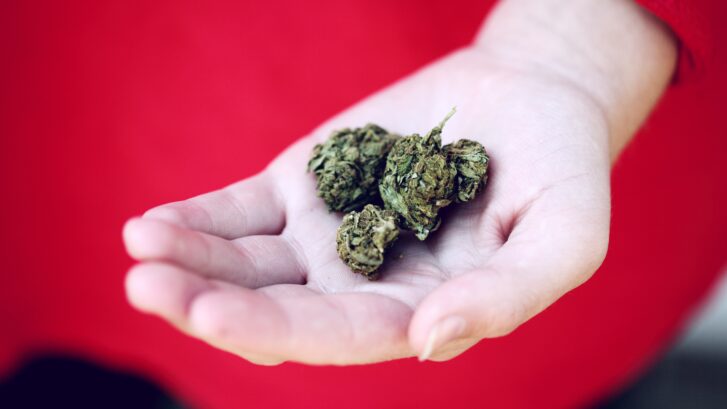Think Twice About Marijuana During Pregnancy
As more places around the country legalize marijuana for recreational use, many people have come to accept the idea that it is a harmless substance. As with any drug, however, our concierge doctors want to caution you that it does contain risks, especially for pregnant women. A new study underscores just how risky it could be during pregnancy.
Not your father’s marijuana
First, you should know today’s marijuana is far more potent than that used by previous generations.
Due to advanced growing techniques and hybridization, the marijuana available today has a far higher concentration of THC, or tetrahydrocannabinol, than even as recently as the 1980s. THC is the psychoactive compound that produces the classic marijuana “high.” Federal officials say the THC potency in those days averaged around four percent. In the 1960s it was around two percent. Today’s levels have been found to be as high as 20-30 percent.
Some products made from marijuana, often designed to be used with vaping devices—such as some edibles, oils, and substances called shatter, crumble, budder, and crystalline—have an even higher THC concentration. These products average 68 percent and occasionally reach as high as 95 percent. As the popular expression has it, “This is not your father’s weed.”
Side effects
These higher levels can increase the chances of an adverse reaction, either in new users or in those who haven’t used the drug in decades. These side effects can include:
- anxiety or panic attacks
- increased heart rate
- dizziness
- breathing difficulties
- impaired memory
- concentration difficulties
Special dangers during pregnancy
In addition to these unwanted side effects, many studies have highlighted special risks to the infants of women who used marijuana during their pregnancy. These risks include the possibility of low birth weight, impulsivity, and cognitive and behavioral issues, according to the Centers for Disease Control and Prevention (CDC).
Now, a new study released this month found marijuana use during pregnancy and breastfeeding may increase the risk of babies potentially developing autism. Researchers analyzed data from more than 500,000 Canadian mothers. They found a 50 percent increase in the risk of autism spectrum disorder in children whose mothers had used the drug while pregnant.
The study, published in the journal Nature Medicine, reviewed data from every birth in Ontario, Canada from 2007 to 2012. Researchers looked only at women who reported having used marijuana during pregnancy. They screened out reported use of other drugs such as tobacco, alcohol, or opioids to control for those substances.
“We know that cannabinoids can cross placental tissue and enter the fetal bloodstream,” Daniel Corsi, an adjunct professor at the University of Ottawa, and the study’s lead author, told NBC News. “Cannabis is not a benign drug and any use during pregnancy should be discouraged.”
Caveats, of course
As with any study of this nature, researchers cautioned their findings were based on association only, and further research is needed. That was especially true in this case. The marijuana use was self-reported by the women, and the time period of the study occured before Canada legalized recreational marijuana use. Other studies have found self-reports for marijuana use tend to understate actual usage, especially where it remains illegal.
“This is an interesting first step, but much more work is needed to implicate maternal cannabis use specifically in autism risk,” Daniele Fallin, director of the Wendy King Center for Autism and Developmental Disabilities at the Johns Hopkins Bloomberg School of Public Health, told NBC News. Fallin was not involved in the study.
Reasons for use in pregnancy
Women use marijuana during pregnancy for a variety of reasons, according to a CNN report. These include:
- pain management
- prevention of nausea or vomiting
- sleep aid
- stress relief
- in lieu of other medications they consider more harmful
Some women also continue to use it during pregnancy because it’s simply a part of their lifestyle.
In addition, medical marijuana (low-THC cannabis or synthetic cannabis) can now be prescribed to legal Florida residents by qualified physicians for certain conditions. These include chronic pain, anorexia due to HIV/AIDS or cancer treatment, glaucoma, seizure disorders, terminal illness and more.
Depending on the type employed, users may or may not experience the “high.” Some medical marijuana has been specially formulated to eliminate the mood-altering effects while still providing relief from symptoms.
Nevertheless, doctors stress the need for caution during pregnancy.
“Pregnant women or women contemplating pregnancy should be encouraged to discontinue use of marijuana for medicinal purposes in favor of an alternative therapy for which there are better pregnancy-specific safety data,” the American College of Obstetricians and Gynecologists (ACOG) recommends.
While recreational marijuana is still illegal in Florida, we know that some will use it anyway. If you are pregnant or contemplating pregnancy, please feel free to discuss this issue with us.

